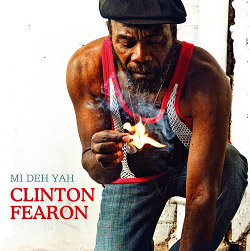Articles about reggae music, reviews, interviews, reports and more...
Clinton Fearon - Mi Deh Yah

Clinton Fearon - Mi Deh Yah
The toil and reward of a simple honest life.
Sampler
In 1987 Gladiators bassist and backing vocalist Clinton Fearon quit the group during their US tour to set up camp in Seattle. His early albums with locally sourced Boogie Brown band showed promise but suggested a sound in the process of being forged. It wasn't until 2004's masterwork 'Give and Take' that his bucolic yet contemporary roots template hit its stride. Four longplayers later he’s still doggedly on the same path, with no discernable drop in quality to be heard.
 A key ingredient is the occasional use of strings, a controversial choice for reggae historians, due to their overdubbing onto seventies UK Trojan releases of Jamaican product to make it more saleable. Yet they are also a sometime feature of Jamaican music past (I Roy’s Blackman Time on Glen Brown’s Slaving rhythm) and present (Beres Hammond’s Still Will Be Heaven, Luciano’s collaboration with US cellist Dave Eggar). As part of Fearon and the band’s organic pastoral arrangements they work perfectly, evoking the toil and reward of a simple honest life.
A key ingredient is the occasional use of strings, a controversial choice for reggae historians, due to their overdubbing onto seventies UK Trojan releases of Jamaican product to make it more saleable. Yet they are also a sometime feature of Jamaican music past (I Roy’s Blackman Time on Glen Brown’s Slaving rhythm) and present (Beres Hammond’s Still Will Be Heaven, Luciano’s collaboration with US cellist Dave Eggar). As part of Fearon and the band’s organic pastoral arrangements they work perfectly, evoking the toil and reward of a simple honest life.
Another facet is the high level of song writing ability that marked out Gladiators.
The lyrics focus on individual autonomy and shared human condition. Opener Life Is A Journey comes to terms with Clinton’s separation from his mother and past self criticism and doubt. The Best tells us “everyone has their own capacity” whereas Feeling Blue instructs to “find your harmony”. As with previous albums some of the rhythms make playful knowing references to Bob Marley before changing a few crucial chords. Just as Feelin’ The Same from 2007’s 'Vision' recalled Jammin’, here Rock And A Hard Place channels the spirit of the 'Rastaman Vibration' LP, telling of “coming from the country” to a world of urban iniquities to the gibber of a Cuica drum.
Clinton supplies both his sonorous, yearning lead vocal and the still crystalline harmonies of his Gladiators days. He has also reclaimed bass duties and his steady hand is particularly felt on the slower, early-dancehall oriented rhythms (and, conversely, ska instrumental departure Focus). Meanwhile, his scrupulous work behind the desk, especially on the processing and effects on the drum sounds, yields his strongest ever results.
If you like your roots reggae hard, heavy and sound system driven then this mature, accessible variant may not appeal. Yet Clinton’s approach demonstrates how purveyors of the original roots music can continue to make records that reflect both their age and heritage while sounding clearly “of today”.
Read more about this topic
Comments actually desactivated due to too much spams
Browse by categories
Recommended Articles
Latest articles
Recently addedView all
© 2007-2026 United Reggae. All Rights Reserved. Reproduction in whole or in part is prohibited. Read about copyright
Terms of use | About us | Contact us | Authors | Newsletter | A-Z














